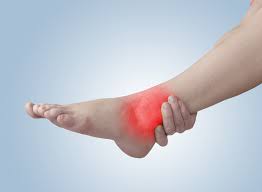If you are an outdoor enthusiast who actively runs, plays tennis, or regularly participates in some type of sport, you most likely experience tendon pain from time to time. Fortunately, you’re not alone. Over 10 million Americans experience tendon pain each year and most cases gradually worsen with time. Even those who aren’t athletic may have some pain in their tendon, especially if they have to do a lot of walking or standing for work.

Pain in your tendon may be fairly infrequent and vanish with a little rest. If that describes what you deal with, you’re fortunate. Many people who deal with chronic tendon pain find that it won’t go away on its own and makes it very difficult for them to work or enjoy their hobbies.
Causes of Tendon Pain
Tendon pain is often caused by stress that gradually develops from repetitive motion, such as walking or twisting your waist. When such stress becomes overwhelming, the tissue surrounding the tendon becomes irritated or damaged and causes pain. Depending on the extent of the condition, patients may not be able to accomplish basic activities such as shaking another person’s hand or texting on their smartphone.
Texting, in fact, is one of the newest major causes of tendon pain. The repetitive motions associated with smartphones, computers, video game controllers, and other pieces of technology do often put strain on the tendons of the wrist. Proper rest can help alleviate this pain, but it also often requires recognizing the cause of your tendon pain and adapting new methods that don’t stress the tendons as much.
[ctaforBlog]
Note that if you have been diagnosed with tennis elbow, pitcher’s shoulder, swimmer’s shoulder, jumper’s knee, or golfer’s elbow, you’re dealing with tendinitis or inflamed, irritated tendons. These specific terms are often used when the cause of your tendon pain is known. The repetitive actions associated with these sports make those who play them frequently very likely to develop tendon pain.
There are a number of other things that can increase your likelihood of developing tendon pain or tendinitis. These include some specific diseases, taking specific antibiotics, and simply getting older. Those who frequently lift heavy items, especially overhead, and those who do repetitive motions for much of their workday are also at a higher risk of tendon pain.
Tendon Pain Symptoms
If you have tendon pain, it generally comes across as a dull ache located in the area that has been overworked. When you move that area, the pain usually increases. It’s also tender to the touch, and that part of your body may feel tight or exhibit some swelling. In some cases, resting and putting ice on the area will help with the swelling, but severe tendon pain will require an appointment with us.
Tendon issues are typically diagnosed by a physical examination and a range of motion test. You will want to let us know about your physical activities, any injuries that have occurred in the area where the pain is, and any medical conditions and medications you’re taking. In some cases, an MRI, ultrasound, or X-ray of the area will be needed to conclusively diagnose your tendon issues.
[ctaforBlog]
Atlanta Orthopedic Treatment for Tendon Pain
Tendon pain can often come from scar tissue that has built up over time. Unlike other forms of traditional treatment that tend to address scar tissue pain, one solution called the “Tenex” procedure actively treats the source of tendon pain. Patients who choose this particular option are given a local anesthetic before a microtip is used to break up the damaged scar tissue without compromising their healthy tissue.

The procedure is usually completed within 20 minutes, and patients are able to return home on their own. The Tenex option also tends to yield quick results as many of our patients are able to exercise comfortably in two months or less. This is considerably faster than surgical intervention, which can take six months to one year to recover.
Other ways of treating tendon pain include wearing a brace or splint on the area, taking corticosteroid injections, or participating in physical therapy. In most cases, surgery is not required. For minor tendon pain, exercising, stretching, and using heat or ice while resting is enough to reduce or eliminate it completely. Identifying the action causing the tendon pain and working out an alternative can help reduce or eliminate chronic pain.
Once your tendon pain has been treated, you will want to implement steps to prevent it from returning. This may include working out more often to improve muscle support around the tendons, adjusting your position, and using equipment designed to help reduce tendon inflammation.
[ctaforBlog]
Contact AICA Orthopedics to Relieve and Treat Tendon Pain
If you experience tendon pain and have tried to seek relief without success, contact our orthopedic clinic right away. Our Atlanta orthopedic doctors can evaluate your condition and provide a treatment plan that’s customized to align with the unique properties of your pain in no time.
Our clinic helps hundreds of patients throughout the greater Atlanta region overcome various types of accident injuries and pain, and we can help you, too. Schedule an appointment with us today online or by calling (404) 855-2141.





